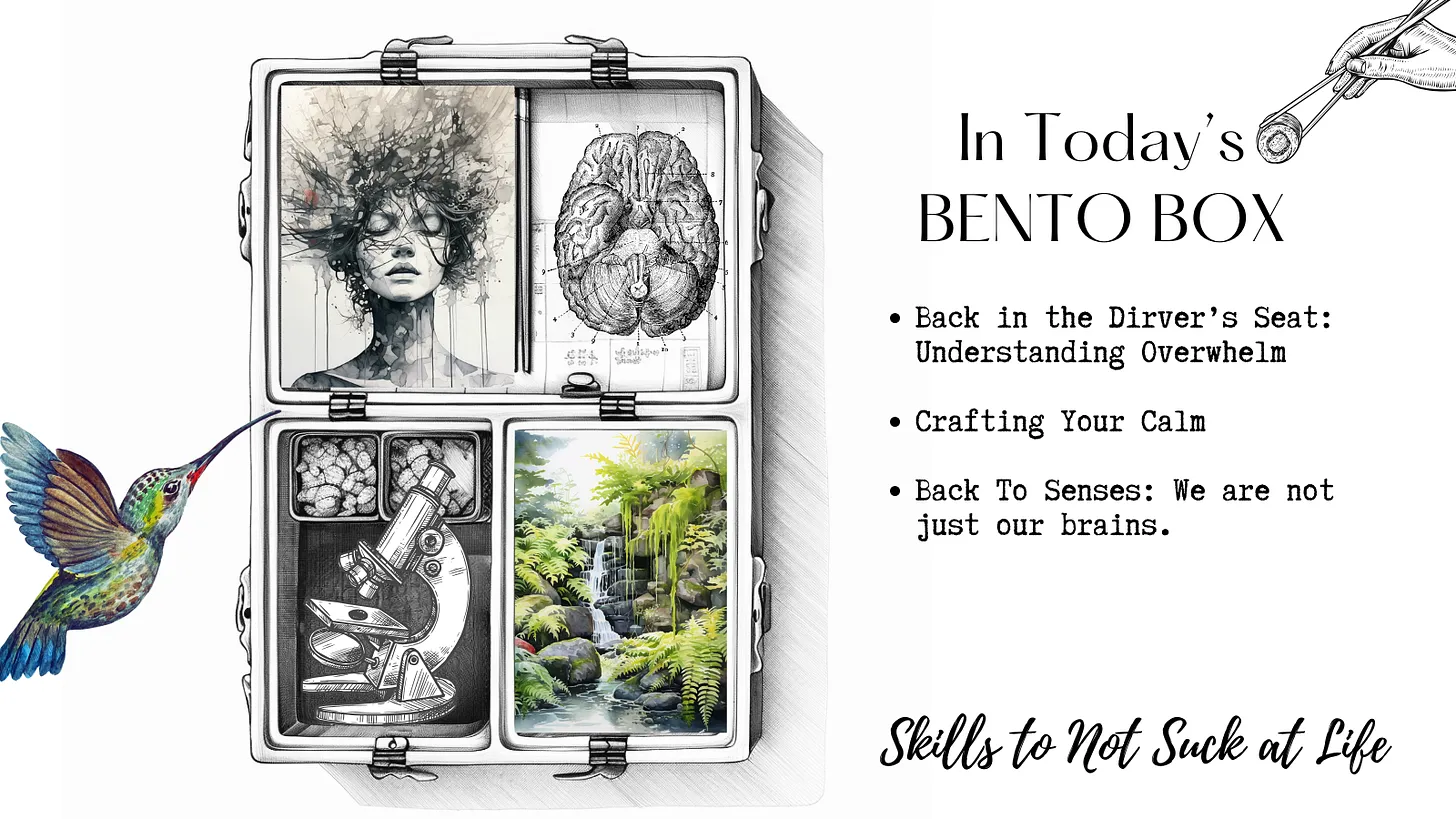Shed the Cognitive Excess & Reclaim Your Peace, One Thought at a Time!
SO, WHAT’S IN TODAY’S BENTO BOX?
Lightening the (Mental) Load & Rest!
Today I want to look at the idea of Cognitive Overload (that can lead to Mental Fatigue) and how to manage it better, aka Restoration.
So why does all of this matter to you?
In the fast-changing and more competitive world, you need every advantage you can get.
A GLIMPSE INSIDE:
- Understanding Overload: Explore the maze of self-imposed information overload and find the balance between extreme productivity and peaceful withdrawal.
- Creating Calm: Discover practical strategies to reduce stimuli
- Seeing Beyond More: move away from the constant chase for ‘more’Subscribed
I suffer from a self-induced information overload (hello, Shiny Objects!) AND suck at rest.
This is a powerful combo that has a potential of paving the road straight to Burnout City.
If you’re reading this, there is a pretty good chance you also fall somewhere on the spectrum between “I want to become crazy productive” and “I want to ditch it all, and run into the woods.”
We are bombarded by information and various stimuli, skim, skip, browse, scroll and end up living in the shallows; always reacting, rarely creating.
The problem is, not all of us have the luxury of going into a Monk Mode, moving to an ashram in India or a hammock in Bali.
So let’s look at what we can do and have enough bandwidth for what truly matters in life.
“More isn’t better. Better is better.”
– Unknown
MORE!
A lot of information is free today, but there is a very real cost to it: you are constantly facing more choice and more decision-making.
Even the decision to not make a decision is a decision.
What’s the currency here? Your attention and willpower.
The two things you need to achieve your real goals.
And yet you spend it on a shit ton of pretty irrelevant decision, so there’s little, if anything left for what really matters.
I suspect many of us spend more cognitive power deciding what to eat for breakfast and choosing our next smartphone than planning our life.
It’s also one of the reasons why you can’t get much done.
There is a hidden costs of multitasking and constant switching, draining our batteries and jamming our mental bandwidth. That stops you from doing the work that could move the needle.
- we keep switching and comparing instead of doing
- we lie to ourselves we can handle multitasking
- we get addicted to cheap dopamine that messes up our willpower
CRAFTING YOUR OASIS OF CALM
“It’s not the presence of stressors that make us susceptible to burnout, but the absence of rest, recovery, and reflection.”
– Dr. Adam Fraser
And there are generally two steps to take:
- Limit Input (Stimuli)
- Restore Body & Mind
HERE’S HOW:
Simplify & Visualize:
- Limit options: create a capsule wardrobe, eat the same 5 meals on rotation.The point is not to make your life dull, but to prioritize what really matters at different stages of your life. You don’t want to think: I haven’t achieved much in life, but I had those lavish breakfasts!
- Do a Brain Dump: try paper like a bullet journal, instead of digital. You want your brain for thinking, not storage.
- Make your work visible and tactile: Out of sight – out of mind. The problem is, we often get it wrong and make the important invisible, and the distracting – not. Let’s change that. Try analog options like a physical kanban board with sticky notes.
- Flip a coin to avoid analysis-paralysis: For less important things in life like this jam or that jam.
- Create a Routine: Figure out what, how and when to do something once and stick to it. It’s a powerful tool to limit resistance and procrastination.
“The mind is like water. When it’s turbulent, it’s difficult to see.
When it’s calm, everything becomes clear.” – Prasad Mahes
Stimuli Fast:
I know that Digital Detoxes are all the rage now, but they are not a very practical way to handle the problem on a daily basis.
Instead of an all-or-nothing approach, try implementing some smaller changes:
Setting device-free hours: Designate specific periods in your day or week as device-free hours :
- Meals
- Mornings
- Bedtime
- Time in nature
- Time with family and friends
Creating tech-free zones: Designate certain areas in your home or workspace as tech-free zones:
- Bedroom
- Bathroom
- Sofa
Engaging in offline hobbies:
Dedicate time to engage in hobbies or activities that don’t involve screens and involve your other senses.
- Exercising
- Gardening
- Deep Reading – on paper, without distractions
- Playing an instrument
- Art
How to Handle Too Much Choice
Sometimes there is no escape and we simply need to choose.
How to do it better? Sheena Iyengar, a professor at Columbia Business School and a globally recognized expert on choice, has some good advice:
- Categorization:
- Organize choices into categories.
- Cut Less Significant Options:
- Eliminate choices that are not significantly different or not as relevant.
- Concretization:
- Make the abstract consequences of choices more concrete.
- Condition for Complexity:
- Start with simpler choices before introducing more complex ones.
- Reduce the Fear of Regret:
- Limit the availability of comparisons or alternatives after a choice is made.
- It helps in reducing subsequent regret.
IF NOTHING ELSE, TRY THIS
Use pockets of time to restore your attention, not scrolling more.
- Take a couple of deep breaths, look out the window, stare at a plant or a bee, walk around the block.
Your brain will thank you for that and work much better!
Above all else, don’t give in to The Illusion of More.
More isn’t always better; it’s just more overwhelming.
STILL NEED SOME CONVINCING?
Empty Your Mind – a powerful zen story for your life.


